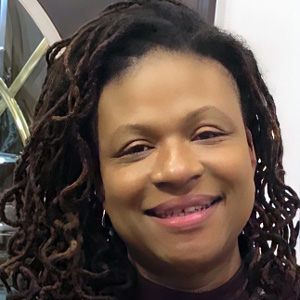Shammica Jones

Shammica Jones
Job Title: National Coach and Trainer
Website: https://www.nwic.org
Member Since: 2024
When Shammica Jones attended her first Wraparound training in 2009, the practice principles immediately felt both familiar and compelling: “I resonated with the values of Wraparound. Basically in my work I had been kind of using these values already, but Wraparound provided me with a framework and clarity that I didn’t have before. So I just knew from that training that I wanted to learn more about Wraparound. I wanted to be a Wraparound expert.”
In the years since, Shammica has gone about realizing that goal. She started by taking the first available opportunity to become a care coordinator and going on from there to a series of roles with increasing responsibility for coaching and training. Most recently, Shammica has joined NWIC (the National Wraparound Implementation Center, part of the Innovations Institute at the University of Connecticut) as a national coach and trainer. Continually working to increase expertise – both her own and others’ – keeps Shammica motivated and engaged in her work. “Even though Wraparound is simple, it’s also complex. And so there is always a possibility for an aha moment that shows growth. Even if people have been facilitators or care coordinators for five years, there’s still room to grow. I just like being part of that process, to help others have experiences that show they are becoming better facilitators and better at helping families reach their goals.”
A key feature of Shammica’s approach to coaching and training is modelling the Wraparound values in her work and continually applying them, particularly when challenging situations arise. “Wraparound understands that everyone has needs and strengths. So for example, when I supervised care coordinators as an internal team of staff, we had a plan of care for ourselves. It was a way for us to meet our own needs and use our own strengths to work towards our goals for the program and address challenges. But also it was a way for staff to experience the process so that it felt more real to them, and so that they were more able to see things from the perspective of the youth and families they worked with.”
Shammica also structures her trainings to include opportunities for participants to experience the Wraparound values at work. One of her favorite training exercises is to have participants break out in pairs and trios to complete a strengths discovery on each other. “When they do it among themselves it’s easier for them to go out and understand why it’s so important to do with families. When another participant shares what they heard you say about how you got through a difficult time, or the positive relationships you have or the important things you do on a daily basis – things that maybe you don’t really think about but now can say, ‘Wow, I do have a lot of value in my life and I bring a lot to the table.’ And then the participants can have that aha moment because it really feels good. Now they really understand that they can give families that same experience.”
In working with care coordinators and other coaches, Shammica reminds them to look to the Wraparound process and values when they encounter challenges. “The toughest thing sometimes is to really allow others – families or care coordinators or whoever – to figure things out for themselves. They may be struggling to figure out what it is that is preventing them from getting to the next level or making a change. Sometimes it is easier or feels better in the moment to be the one who has the answer, to say, ‘Well, they are struggling because of this, and this is what they should do.’ But really as a good facilitator or supervisor or coach, what you want to do is guide them through a process without trying to give them an answer. You need to be okay with working with them through the process of learning and figuring things out, and being okay if that takes some time. Then together you are showing that they have that ability to learn and move forward, and you leave them with tools and a level of functioning they didn’t have before.”
